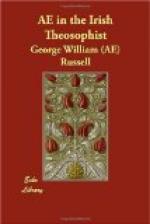I was silent. I knew better than they that busy city which glowed beyond the dark forests. I had lived there until, grown sick and weary, I had gone back to my brothers on the hillside. I wondered would life, indeed, go on ceaselessly until it ended in the pain of the world. I said within myself—Oh, mighty Brahma, on the outermost verges of they dream are our lives; thou old invisible, how faintly through our hearts comes the sound of thy song, the light of thy glory! Full of yearning to rise and return, I strove to hear in the heart the music Anahata had spoken of in our sacred scrolls. There was silence, and then I thought I heard sounds, not glad, a myriad murmur. As I listen it deepened, it grew into passionate prayer and appeal and tears, as if the cry of the long-forgotten souls of men went echoing through empty chambers. My eyes filled with tears, for it seemed world-wide, and to sigh from out many ages, long agone, to be and yet to be.
“Ananda! Ananda! where is the boy running to?” cried Valmika. Ananda had vanished into the gloom. We heard his glad laugh below and then another voice speaking. Presently up loomed the tall figure of Varunna. Ananda held his hand and danced beside him. We could see by the starlight his simple robe of white. I could trace clearly every feature of the grave and beautiful face, the radiant eyes; not by the starlight I saw, but because a silvery shining rayed a little way into the blackness around the dark hair and face. Valmika, as elder, first spake.
“Holy sir, be welcome. Will you come in and rest?”
“I cannot stay now. I must pass over the mountain ere dawn; but you may come a little way with me—such of you as will.”
We assented gladly—Kedar and I; Valmika remained. Then Ananda prayed to go. We bade him stay, fearing for him the labour of climbing and the chill of the snows, but Varunna said: “Let the child come; he is hardy; he will not tire if he holds my hands.”
So we set out together and faced the highlands that rose and rose above us; we knew well the way even at night. We waited in silence for Varunna to speak, but for nigh two hours we mounted without words, save for Ananda’s shouts of delight and wonder at the heavens spread above us. But I was hungry for an answer to my thoughts, so I spake.
“Master, Valmika was saying, ere you came, how good it was to be here rather than in the city where they are full of strife, and Kedar thought their lives would flow on into fiery pain and no speech would avail. Ananda, speaking as a child indeed, said if one went down among them they would listen to his story of the happy life. But, Master, do not many speak and interpret the sacred writings, and how few they are who lay to heart the words of the gods! They seem, indeed, to go on through desire into pain, and even here upon our hills we are not free, for Kedar felt the hot glow of their passion and I heard in my heart their sobs of despair. Master, it was terrible, for they seemed to come from the wide earth over, and out of ages far away.”




